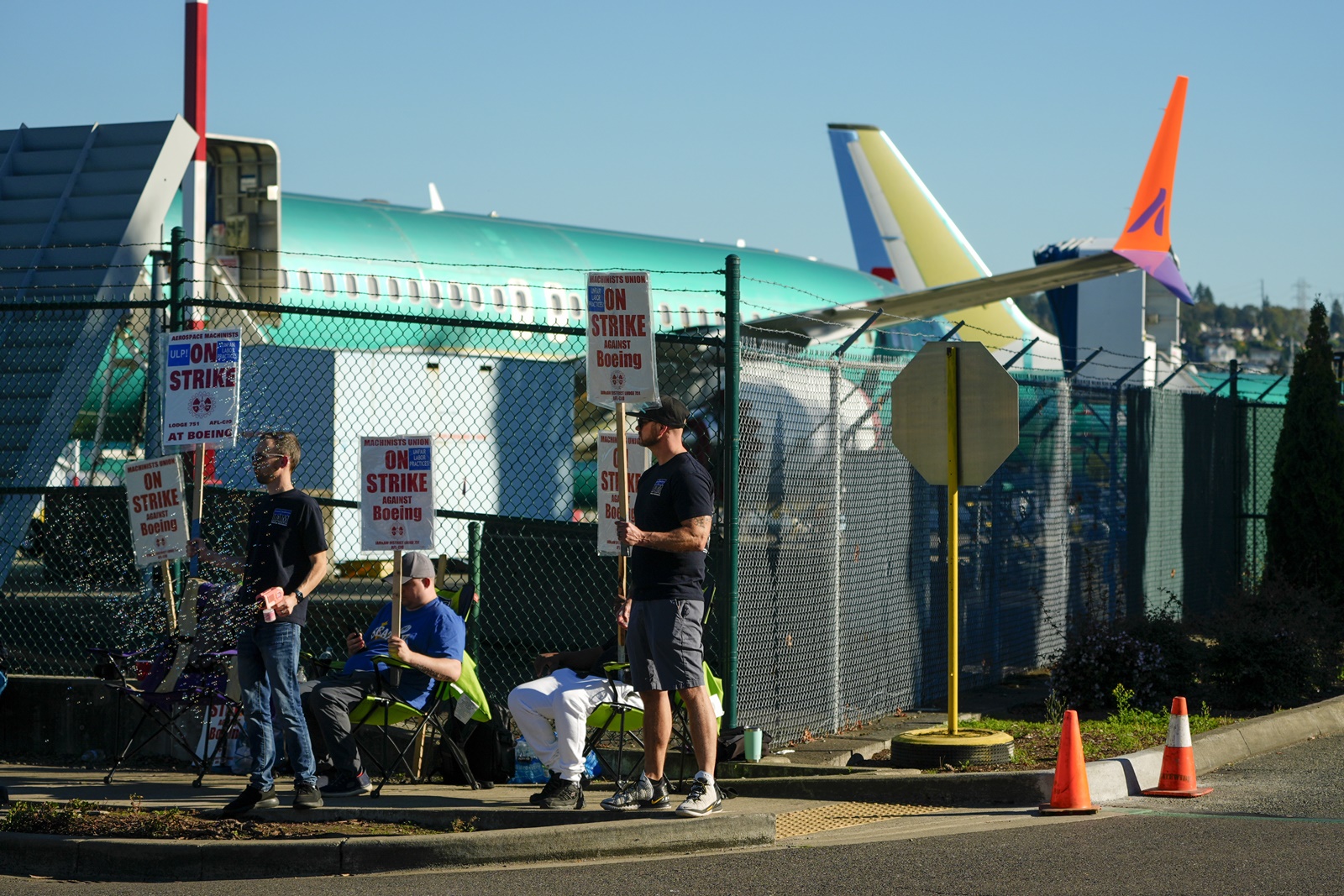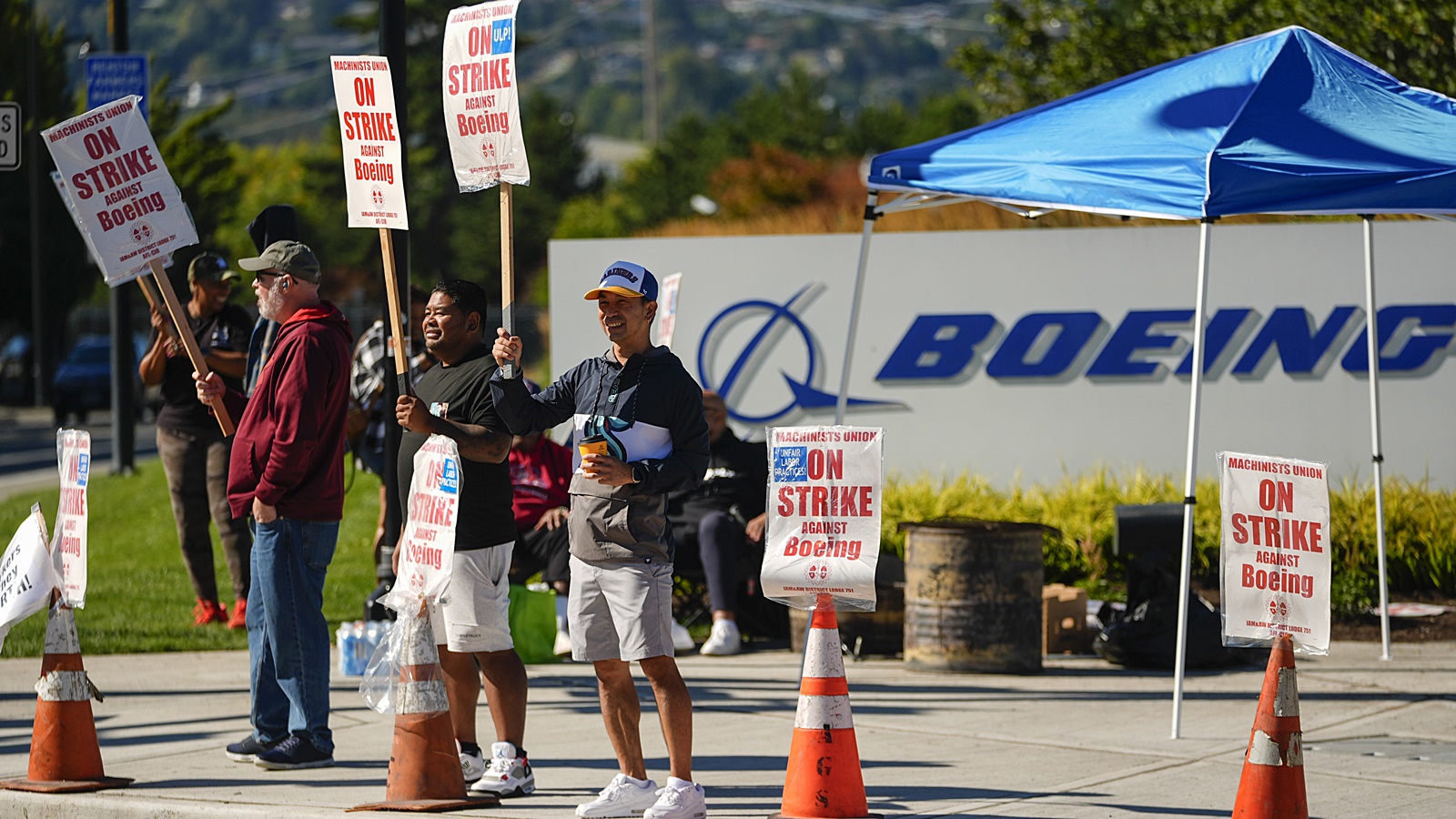Talks between American aerospace major Boeing and the Union representing around 33,000 of its striking workers collapsed Friday with no further negotiations scheduled for the time being.
This has left Boeing’s customer airlines globally — among them India’s Akasa Air and Air India Express — disconcerted and anxious. However, they might not be pressing the panic button just yet.
The strike over wage revision, which has now entered its third week without a resolution in sight, has brought to a grinding halt the production of Boeing’s best-selling 737 narrow-body aircraft, which currently have nearly 5,000 outstanding orders. Boeing’s aircraft delivery schedules, which were already delayed due to other problems, could be hit further in the event of a protracted strike.
So, how worried are Akasa Air and Air India Express, which have 300-plus Boeing 737 MAX aircraft on order between them?
According to sources in the two airlines and industry watchers, the strike is unlikely to impact the carriers’ planned operations in the immediate-to-near term as they are assured of aircraft deliveries till the end of this year, and their network and capacity expansion plans in the short term are already tuned to that schedule. The key concern is the impact that a potentially long-drawn-out strike could have on aircraft deliveries over the subsequent months and even the next couple of years. But any clarity on that front is contingent upon the resolution of the strike.

 Boeing 737 Max aircrafts are seen behind fences as Boeing employees work the picket line while striking. (AP Photo)
Boeing 737 Max aircrafts are seen behind fences as Boeing employees work the picket line while striking. (AP Photo)
Additional delays could directly hinder the airlines’ capacity and network expansion plans over the medium term, sources indicated. Then there could be additional headaches like inability to acquire and hold additional slots at airports due to slow capacity addition, being forced to extend leases on older and less efficient aircraft (in Air India Express’s case) that were to be replaced by the new jets, and difficulty in retaining pilots who are on the bench and not released for flying due to aircraft delivery delays—more relevant for Akasa Air.
The airlines are in regular touch with Boeing but with no real progress in negotiations with the workers’ union, the aircraft manufacturer has not given the carriers any guidance on the agitation’s likely impact on delivery timelines, it is learnt.
“We know our business challenges cause disruption for our customers and we deeply regret the impact on them. We continue to provide technical support and stay in close contact with our customers during this time,” Boeing said in response to The Indian Express’s queries. Air India Express and Akasa Air did not respond to requests for comments.
“The strike at Boeing is not of immediate concern for us as we are already ahead of our projected timelines in terms of capacity and network plans. Of course, from a longer-term perspective, it could become a problem if the strike is not resolved within a reasonable timeframe and production and deliveries get delayed significantly…We will have to see how this unfolds,” said a source at Air India Express, who did not wish to be identified.
The Air India group had ordered a total of 190 737 MAX planes in 2023, and most of these are going to its budget airline Air India Express. The airline has already received 35 aircraft, with another 15 expected by the end of the year. But such prompt deliveries have been possible because 50 of the 190 aircraft ordered were “white-tails” or remarketed planes, which were manufactured for other airlines but remained unsold as the original orders were cancelled. Often, airlines are quick to buy such aircraft as they are readily available off the shelf with the manufacturer, while planes manufactured based on their orders can take years to be delivered.
The remaining 140 made-to-order 737 MAX aircraft for Air India Express were expected to start coming in sometime next year. Air India Express and AIX Connect (formerly AirAsia India), which is in the process of being merged into the former, currently have a combined fleet of 86 aircraft, over 50 of which are older Boeing 737s and Airbus A320s. By 2028, the merged Air India Express aims to have a fleet of 180 aircraft.
“We are not worried currently. Considering the problems Boeing has faced in recent years, they have still been good partners to us. For now, we are alright but how this plays out over time is something that we would be looking at…our patience will depend on how circumstances evolve,” an Akasa Air official said, speaking on the condition of anonymity.
Akasa Air, which ordered a total of 226 Boeing 737 MAX aircraft through two separate orders, has received 25 planes and is confident of two more deliveries this year. The fledgling airline, too, saw swift deliveries initially as 24 of its aircraft were white-tails. The airline’s 25th aircraft, which it received earlier this month, is its first plane that was manufactured for it. The delivery of this aircraft was delayed by nearly six months as production at Boeing was already affected due to various reasons, including increased oversight, quality checks, and audits by the US aviation regulator following a mid-air door plug blowout on a 737 MAX jet in January.


